
The First and Only Weekly Online Fanzine Devoted to the Life and Works of Edgar Rice Burroughs |
 |

The First and Only Weekly Online Fanzine Devoted to the Life and Works of Edgar Rice Burroughs |
 |
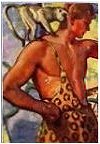
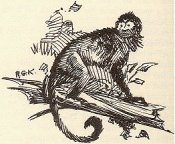
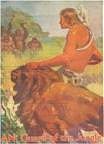
Tarzan and The War Against the
Hun
By David A. Adams
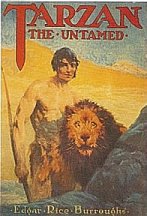
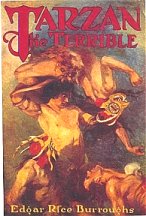
Edgar Rice Burroughs wrote his two Tarzan "war novels" Tarzan the Untamed (1918) and Tarzan the Terrible (1920). They were inspired works that turned out to be the among the best of his novels. Dr. Zeuschner tells us that Terrible "reflected Burroughs's strongly negative attitude towards Germany as a result of World War I." Indeed, the Germans are the villains in these works: Hauptmann Fritz Schneider, Unterlieutenant von Gross, Fraulein Bertha Kircher, General Kraut, Lieutenant Obergatz, among the deadly crew. General Jan Smuts is correctly mentioned by name as the commander of the Allied forces in East Africa, however, it seems that the names of the German participants were changed by ERB in his stories.
Lettow-Vorbeck - A Good German
Not to rewrite history, nor second-guess ERB, I would like to set the record straight on at least one of the German officers -- Paul Emil von Lettow-Vorbeck. I don't suppose there is much sympathy for one of "the Hun," but Lettow-Vorbeck was at least a good commander who kept the English on the run under hostile conditions. One might even say that he was a brilliant leader, but then . . . I won't push the issue. Here is a little piece from http://raven.cc.ukans.edu
"Lettow-Vorbeck, General Paul Emil von. (1970-1964) Born in Saarlouis, Germany. As a lieutenant-colonel in February, 1914, he was appointed commander of the forces in German East Africa, with a dozen companies of askari troops. In August, 1914, effectively isolated from outside command, von Lettow-Vorbeck launched a series of effective raids against the British railways in Kenya, attempted to conquer Mombasa, fought off a British amphibious attack on Tanga and finally captured large amounts of arms and ammunitions to supply his troops. von Lettow-Vorbeck managed to salvage the guns from the destroyed ship "Konigsberg," and was able to use these along with the rigours of the terrain to hold off the offensive of Gen. Jan Christian Smuts in March, 1916. He remained continually on the offensive, gradually working south, and in December 1917 invaded Mozambique, and advanced as far south as Quelimane (July 1918), invaded Rhodesia in the fall and captured Kasama, Zambia on 13 November 1918. He officially surrendered to the British, having never been defeated, on 23 November 1918, at Mbaala, Zambia, and arranged for the re-patriation of German soldiers and prisoners of war before his departure for Germany in January, 1919. von Lettow-Vorbeck never had more than approximately 12,000 troops at his disposal, but tied down as many as ten to twenty times that number of Allied troops."Also, Lettow-Vorbeck was a good friend of Karen Blixen, the Danish noblewoman who wrote the hauntingly beautiful book "Out of Africa" under the pen name Isak Dinesen.
War Propaganda
Even Porges confesses that Ed had been carried away by war propaganda while writing these novels. He also points out that he was not the best example of a soldier during his own military career.
"Despite his past censure of the army for its bungling and inefficiency, and curiously, despite the fact that in his own youthful army career he had been unable to adjust to the discipline, had been a rebel, and had implored his father to get him out of the cavalry as quickly as possible, the arrival of a national emergency aroused his pride in the military and stimulated an intensely chauvinistic attitude. In common with many other Americans he blindly accepted the vicious anti-German propaganda. An illustration of this found in 'Home-Guarding for the Liberty Loan,' with its bloodthirsty reference to the 'Hun' and 'Boche.'" (Porges, 287-288).Ed's feelings at this time against the Germans was strong. He wrote to Joseph Bray about his proposed new Tarzan novel (Tarzan the Untamed),". . . although I know nothing about the Germans in Africa, I have learned enough about the Germans in the last four years to know that there ain't no such thing as a good German record (in the colonies). Having reveled in hate for the last four years, I should dislike to give up the pleasure derived therefrom by thinking any good thoughts whatever about Germans. Therefore if I write this story, I shall put the wickedest kind of Germans into it and let Tarzan chew their hearts out." (Porges, 325).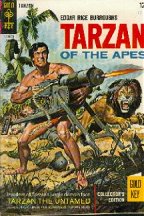
The German Death of Tarzan of the ApesERB's "war" Tarzans came up against criticism in Germany when they were marketed there after the war. At first, Ed, arrogantly commented, "If they knew half what I thought of the Germans, they would not want any of my books." (Porges, 390). But later, Ed, even suggested changing the Germans into Austrians but wondered about this effect on his Austrian market. (Porges, 392)."As yet, Burroughs was not concerned with the moral question or the injustice of these indictments of the Germans; his only worry was that German sales might be affected. He was even willing to change his villains into Austrians. Under these circumstances he would have been condemning the Austrians collectively. Granted he needed his villain, but there was a great difference between portraying an individual sadist or murderer and in damning a whole race. This Burroughs would perceive at a later period." (Porges, 393).A 1925 article called "Tarzan the German-Devourer" by Stefan Sorel put the torch to the situation. Ed, started to back-peddle to save his German market, even telling his publisher, Charles Dieck, that "The War Lord of Mars" was based upon his admiration for the Kaiser! He wrote a 4-page letter "To My German Readers," trying to smooth things over, but nullifying its effect by saying, "I cannot apologize for an honest conviction however mistaken it may have been." He also said that some of his best friends are German, and the effect was a series of violent denunciations of him and his Tarzan stories. It was said that all his works should be consigned to the "garbage can," and even Felix Salten, the popular author of "Bambi," offered a contemptuous estimate of his writing ability. In the next round, questions arose concerning jealousy by German writers and publishers over ERB's great success in their country. But it was too late, and his Tarzan market in Germany collapsed, Mr. Dieck losing 30-40 thousand marks."The German disaster had at least produced one positive result. From here on Ed would display extreme caution in his judgment of all foreigners, both personally and in his fiction:" (Porges, 397).
Major P. J. Pretorius - A Boer Who Fought for England - the "Jungle Man"
Rather than stirring up war propaganda and following his "gut reactions" ERB might have looked into the situation in Africa with some balance and come up with something less offensive to the German people. Jan Christian Smuts, the leader of the English troops was himself a Boer, and, P. J. Pretorius, one of the heroes of the fighting, was another. Of course, the Boer's had no love for the "Hun" but, the story, as in every war, was not as black and white as ERB was in the habit of writing.
The following account was gleaned from "Death in the Silent Places" by Peter Hathaway Capstick. His story, like Tarzan's own was filled with a hatred of Germans and a desire for revenge.
P.J. Pretorius, was a descendant of the famous Boer Voortrekker general who gave his name to Pretoria, South Africa. He was a dark-complexioned man who looked more like a Somali or an Arab than a European. He rode transport for the British South Africa Company in 1893 during the war with King Lobengula of the AmaNdebele Zulu. Over the years he wandered over much of the Zambezi region, even penetrating as far as "King Khama's Country," modern Botswana. He lived in the Congo with Pygmies, fought cannibals, dug for gold, and most critically for his future as a soldier, became an ivory hunter and later poachers in German East Africa.
In 1904, he was arrested by the Germans for killing cannibals who were trying to kill him. After two years of imprisonment and red tape, he found that the German authorities had sold off his entire cattle herd of 774 head to favored politicians for 150 English pounds. Several years later, when he had built his farm up again, he was forced to tell it to Hauptmann (Captain) Blake, a German officer. It was then that Pretorius became an ivory poacher -- to recover his losses -- and to become a thorn in Hun flesh.
When WWI began, August 14, 1914, he was in German territory shooting elephants. A native patrol under Leutnant Wak almost captured him but left him wounded in both legs. He was picked up by friendly natives and carried across the Ruvuma to the Portuguese side of the river. One thought burned in his brain -- revenge. Up at Mazewa, he discovered that Dr. Da Costa and his wife had both been butchered by the Germans. He had to open the wound in his leg to let out the poison, but he finally reached Malindi on Lake Nyassa, British Central Africa, 26 days after being shot!
Months later, Pretorius went to the recruiting office in Pretoria, South Africa, but was flatly refused. They thought his story to be too fantastic -- he must be a German agent. Weeks later, all this reversed. He was summoned to meet Admiral King-Hall aboard the battleship "Goliath." His mission was to find the German battle cruiser "Konigsberg," which was hidden somewhere up the Rufiji -- his old hunting grounds.
The British center of operations for this hunt was 22 miles off the mouth of the Rufiji -- the island of Mafia. Pretorius picked six ruffians and kidnapped a couple of locals, who were only too willing to act as their guides. They found the well-camouflaged ship, and after a few more trips back and fourth to get the correct bearings (even going into the German camp to get the location of the accompanying torpedo boats) the ship was blasted to eternity. It had been tracked, stalked and hunted to her den by a lean, quiet, dark-faced man who had learned not to like Germans.
Actually, the whole operation took months to accomplish. Pretorius spent the rest of the war behind enemy lines as the chief scout to General Jan Smuts, commander of the South African Allied forces.
During the battle for Taveta, General von Lettow-Vorbeck staged a withdrawal action, badly mauling the South African infantry and the Second Rhodesians. But Pretorius' suggestion to cut off the water to Salaita had worked. During most of his action, he moved like a ghost through enemy territory gathering information. He got so close to the Germans that one day, in a trench he thought was deserted, he was saluted as one of their officers.
Pretorius was known as "Jungle Man." He was so wary that he never slept twice in the same place while in the field. He had a sort of "sixth sense" and once he moved his dry troops (20 men) into the rainy night just before his camp was attacked. Another time he witnessed 7 of his men being slowly hung from trees by the Hun, so all the stories of atrocities were not imagined by ERB. The famous hunter and scout, Frederick Courteney Selous, was killed by a sniper when he acted as a replacement at the last minute on one of the missions planned for Pretorius. Obviously, he didn't have the same "sixth sense." Later, another good man, van de Merwe, was taken by perhaps the same sniper out to get Pretorius. He was a man with a price on his head.
Pretorius was indeed a thorn in the side of Lettow-Vorbeck throughout the war. He persuaded more than 2000 German territorial natives to revolt and fight for the Allies -- for which he won a bar for his "Distinguished Service Order" medal. In his last engagement, he took the Tafel column on the Ruvuma river right under the nose of Lettow-Vorbeck. 4,500 of the enemy surrendered to the nearby General Hannyngton, commander of King's African Rifles, after Pretorius had managed to starve them into submission by his scorched-earth policy.
After the war, Pretorius returned to his adventurous life of big-game hunting. He was a pioneer in film making to record the charges of dangerous game, particularly lions, which he killed mere feet in front of the camera's lens.
A very shy and modest man, he was persuaded by a good friend, Mr. L.L. leSueur of Johannesburg, to make notes of his fascinating life. It came out as "Jungle Man" in 1948, nearly three years after his death in 1945 at the age of sixty eight.
It seems there was a real Tarzan out there in those days.
Nkima
1/29/02
|
David "Nkima" Adams' ERBzin-e homepage ERBzine 0396 to see the navigation chart of all of his Chattering From the Shoulder columns and other appearances in the Hillman ERB Cosmos |
|
See: http://www.erbzine.com/mag32/3294.html |
![]()
![]()
Volume
0793

BILL
HILLMAN
Visit
our thousands of other sites at:
BILL
AND SUE-ON HILLMAN ECLECTIC STUDIO
All
ERB Images© and Tarzan® are Copyright ERB, Inc.- All Rights Reserved.
All
Original Work © 1996-2002/2011 by Bill Hillman and/or Contributing
Authors/Owners